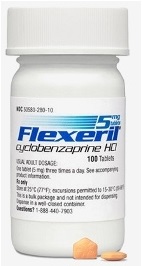
What is cyclobenzaprine and how does it work?
Cyclobenzaprine is a prescription medicine that is used in the short term to treat muscle spasms. It is usually used together with rest and physiotherapy. It helps to relax the muscles.
Cyclobenzaprine is available under the following brand names: Flexeril , Amrix and Fexmid.
Dosages of Cyclobenzaprine:
Tablet (adults and children)
- 5 mg
- 7.5 mg
- 10 mg
Extended-release capsule (adults only)
- 15 mg
- 30 mg
Dosage considerations – should be given as follows:
Take this medicine with or without food as directed by your doctor, usually once daily. Swallow the capsules whole. Do not crush or chew capsules. Otherwise, the entire medicine may be released at once, increasing the risk of side effects.
This medicine is not recommended for use in older adults because they are at higher risk for side effects while using this medicine.
This medicine should only be used for a short time (for 3 weeks or less) unless your doctor tells you to. Do not increase your dose or use this medicine more often or for longer than prescribed. Your condition will not improve faster and your risk of side effects will increase.
Muscle cramp
Immediate-release tablet
- Adult: 5 mg orally every 8 hours, may increase dose to 7.5-10 mg orally every 8 hours as needed
- Under 15 years: Safety and efficacy not established
- Over 15 years: 5 mg orally every 8 hours, may increase dose to 7.5 mg orally every 8 hours as needed
- Geriatrics: immediate-release tablet: initially 5 mg / day orally; slowly dose upwards and consider less frequent dosing
Extended-release capsule
- Adults 15 mg orally once daily; Some patients may require up to 30 mg orally once daily.
- Under 18 years of age: Safety and efficacy not established
- Geriatrics: extended-release capsule is not recommended in the elderly due to increased plasma levels (40%) and half-life (56%) compared to young adults
Dosage changes
Hepatic impairment
- Immediate-release tablet: initially 5 mg/day orally; dose slowly and dose less frequently
- Extended-release capsule: not recommended for mild to severe hepatic impairment
Renal dysfunction
- Not studied
What are the side effects of using cyclobenzaprine?
Common side effects are:
- Drowsiness
- Dizziness
- dry mouth
- tiredness
- hoarseness
- headache
- fatigue
- fast or irregular heartbeat
- bad taste in the mouth
- indigestion
- blurred vision
- constipation
- lack of energy or physical weakness
- confusion
- nausea
- nervousness
- irregular heartbeat
- low blood pressure
- fainting
- fast heartbeat
- widening of the blood vessels
- hepatitis
- yellow skin or eyes (jaundice)
- Immune hypersensitivity reaction
Rare side effects of cyclobenzaprine are:
- abnormal heartbeat
- reduction or interruption of bile flow
- acute allergic reaction
This document does not include all possible side effects, and others may occur. Ask your doctor for more information about side effects.
What other medicines will interact with cyclobenzaprine?
If your doctor has told you to use this medicine, your doctor or pharmacist may already know about and may be monitoring you for possible interactions with other medicines. Do not start, stop or change the dose of any medicine until you have first checked with your doctor, health care professional or pharmacist.
Serious interactions of cyclobenzaprine include:
- Isocarboxazid
- Phenelzine
- Tranylcypromine
Cyclobenzaprine has moderate interactions with at least 43 different medicines.
Cyclobenzaprine has mild interactions with at least 221 different medicines.
Minor interactions of cyclobenzaprine include:
- Desipramine
- Dimenhydrinate
- Donepezil
- Eucalyptus
- Galantamine
- Sage
- Tacrine
- Trazodone
This document does not include all possible interactions. Therefore, before using this product, inform your doctor or pharmacist of all the products you use. Keep a list of all your medicines with you and tell your doctor and pharmacist. Ask your doctor if you have any health questions or concerns.
What are warnings and precautions for cyclobenzaprine?
Warnings
- Buspar 7.5 mg twice daily
- This medicine contains cyclobenzaprine. Do not take Flexeril, Amrix, or Fexmid if you are allergic to cyclobenzaprine or any of the other ingredients in this medicine.
- Keep out of the reach of children. In case of overdose, seek medical attention immediately or contact a poison control centre
Contraindications
- Avoid use in hypersensitivity to cyclobenzaprine or in hyperthyroidism.
- During the acute recovery phase of a myocardial infarction and in patients with irregular heartbeat, heart block or conduction disorders, or heart failure.
- Do not use concomitantly or within 14 days of discontinuation of antidepressants
- Hyperpyretic crisis seizures and deaths have occurred in patients receiving cyclobenzaprine (or similar) tricyclic antidepressants ) concomitantly with antidepressants
Effects of drug abuse
- May cause drowsiness/drowsiness; do not take alcohol or other central nervous system depressants as this may impair ability to operate heavy machinery
Short-term effects
- May cause drowsiness / dizziness; Do not take alcohol or other central nervous system depressants as this may impair ability to operate heavy machinery.
- See ‘What side effects are associated with the use of cyclobenzaprine?’
Long-term effects
- The use of cyclobenzaprine is only recommended for short periods of 2-3 weeks
- See ‘What side effects are associated with the use of cyclobenzaprine?’
Precautions
- Use only for short periods of 2-3 weeks
- Use caution if urinary retention, narrow-angle glaucoma or intensive outpatient programme or concomitant use of other anticholinergics is present
- May cause drowsiness/drowsiness; do not take alcohol or other central nervous system depressants as this may impair ability to operate heavy machinery
- May be taken with food to avoid stomach upset
- Serotonin syndrome reported with concomitant use with other drugs that increase serotonin levels (e.g. selective serotonin reuptake inhibitors, serotonin-norepinephrine reuptake inhibitors, tricyclic antidepressants, tramadol , bupropion , meperidine , verapamil or antidepressants [see also contraindications]).
- Not effective for the treatment of spasticity associated with brain/spinal cord disorders or paediatric cerebral palsy.
- Elderly patients may be more susceptible to side effects and require dose / frequency reduction
- Use immediate release with caution in liver dysfunction. Avoid extended release form as this is not recommended in hepatic dysfunction
Pregnancy and lactation
- The use of cyclobenzaprine in pregnancy may be acceptable
- Either animal studies show no risk but no human studies are available, or animal studies showed little risk and human studies have been done and showed no risk
- Check with your doctor before use
- Cyclobenzaprine excretion in breast milk is not known
- Use with caution
- Ask your doctor before use

